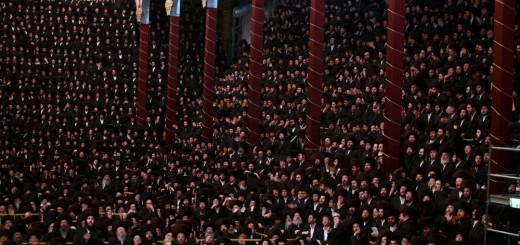Anti-Zionism Equals Anti-Semitism

What is the likelihood that the op-ed writer, or cartoonist, or university professor who rants about the evils of Zionism is really an old-fashioned Jew-hater? Much better than most of us thought, according to a study in the August 2006 issue of The Journal of Conflict Resolution.
Goebbels was right. Repeat a lie often enough, and people will believe it. This seems to be true even in regard to Jews believing lies about themselves. For decades, so many of us heard pious protestations that strongly held views about Israel had nothing to do with attitudes towards us, that we started to believe it might be true. We didn’t want to believe that classic anti-Semitism was alive and well. It is Israel and the accursed Zionists they were after, not the Jewish people. The Soviets thundered this from the podium at the UN; leftist intelligentsia fed it to their students in the classroom and their readers in the Guardian and listeners to the BBC. Neturei Karta was stupid and/or treacherous enough to fully embrace it.
It isn’t true. Those who hate Israel, hate Jews, according to Yale researchers Edward Kaplan and Charles Small.
Even after controlling for numerous potentially confounding factors, we find that anti-Israel sentiment consistently predicts the probability that an individual is anti-Semitic, with the likelihood of measured anti-Semitism increasing with the extent of anti-Israel sentiment observed.
Kaplan and Small compared respondents in ten European countries (500 in each) on two series of statements, one that measured distaste for Israel and her policies, the other about the nature and behavior of Jews. They controlled for other factors, such as hostility to all members of “outside” groups. They did find less anti-Semitism in women, and people with better education (with the apparent exception of college profs and French and British politicians). They also showed that hostility to Jews correlated well with negative feelings about immigrants.
Can one be a critic of Israel and indeed not harbor anti-Jewish feelings? Categorically yes – if the criticism of Israel is not particularly pronounced. In their words:
It is noteworthy that fewer than one-quarter of those with anti-Israel index scores of only 1 or 2 harbor anti-Semitic views (as defined by anti-Semitic index scores exceeding 5), which supports the contention that one certainly can be critical of Israeli policies without being anti-Semitic. However, among those with the most extreme anti-Israel sentiments in our survey (anti-Israel index scores of 4), 56% report anti-Semitic leanings. Based on this analysis, when an individual’s criticism of Israel becomes sufficiently severe, it does become reasonable to ask whether such criticism is a mask for underlying anti-Semitism.
You are reading this prior to its discovery by the general media. Watch for it. It is hard to believe that this study will not make the circuit of print media and talk shows in the coming months.
A complication of this study is that we may not be able to do much with it. Many of our non-Jewish friends tell us that Jews use the anti-semitism charge so frequently, that others mistrust it. They, too, have bought into the idea that you can criticize Israel without hating Jews. Unless the findings of this study become widespread and survive criticism, it may be counterproductive to yell louder about Jew-hatred outside our own community.
At the Simon Wiesenthal Center, we borrowed a bit of phraseology from an unknown donor, and it has resonated with many non-Jews. We have repeatedly talked about “functional anti-Semitism.” This means taking positions that treat Jews differently from others (e.g. Natan Sharansky’s 3D rule: double-standard, demonization, delegitimization), even when no animus of Jews is involved. It is a point worthwhile pondering, and incorporating in conversation with others. Apparently, folks who are uncomfortable about thinking that some of their friends and associates may be bigots are willing to consider that certain positions amount to the same, even absent the sentiment.
Sometimes those of us involved with non-Jewish groups must make hard decisions even without invoking labels. Consider the reactions of liberal Protestants to the war, and the undeniable and unfortunate suffering it has caused to civilians on both sides. (Denying that is both morally wrong, and damaging to our cause.) For many historical and theological reasons, it is not at all unexpected that liberal churches should lean towards the Palestinian side; should seek an early end to hostilities; should offer assistance and succor to the Christian community in Lebanon. While many Jews unacquainted with Protestant thinking might be horrified at the lack of overt support for Israel, I can live with it without liking it. At least, that is, if they do not turn a blind eye to Israel’s plight, and her right to defend her citizens from a storm of rockets aimed at her citizenry. When each of the denominations issued statements tilting towards the other side, I did not get all exercised over it, since they also did acknowledge that Israel was entitled to some sympathy as well.
Each denomination, except one. John Thomas of the UCC has a long record of hostility towards Israel, and his letter was so over-the-top (it was called to our attention by people in his own church), that we took our gloves off, which we rarely can do, but felt that we had to in this case. The response has been unexpectedly positive. (We were even linked by Little Green Footballs!) We apparently touched a real nerve in people in both the UCC and other liberal denominations, who have long been unhappy with the political extremes of their leadership that have sounded more and more like leftist dogma, and less and less like balanced moral thinking. They were tickled pink that we said things that they have felt, and never had the opportunity to publicly express. My favorite (Admission: I composed it myself) was a question about whether John Thomas’ theology had replaced G-d with Che Guevara.




Thanks for reminding me of that. I struggle with this as well. I am a left Jewish Zionist and I hate the company of those who are not Jewish who oppose the war at the moment precisiely because the abrogate Israel’s right to exist as well as being generally not well minded towards Jews at times
Lets be honest- there were many great leaders of the Jewish people that took a very strong and open anti-zionist position. What seperates them from the neturei kartaniks of today, is that those rabbonim not only had tremendous ahvas yisroel for ALL jews (even ones that differed in their relation to zionism), but they would never even think of aligning themselves with the haters of klal yisroel and Israel. But still, it would be silly and naive to entertain the thought that being anti-zionist automatically constitutes anti-semitism.
*On a side note one must be very clear in how they translate Zionism (eg:religious zionism/secular
according to the torah/devoid of religion)
For anyone who wants to read John Thomas’ over-the-top letter and the Simon Wiesenthal Center’s no-pussy-footin’-around response, look at the topmost July 20, 2006 posting at http://www.UCCtruths.com/ (Sorry, there’s no permalink.)
When people refer to Zionism, what they normally mean is not a specific philosophy advanced by Herzl, Jabotinsky, Rav Kook, or others, but the idea of Jewish settlement and control of the Land of Israel. Those who object to Jewish settlement and control there usually do so because they object to Jews everywhere.
“When people refer to Zionism, what they normally mean is not a specific philosophy advanced by Herzl, Jabotinsky, Rav Kook, or others..”
I just feel obliged to mention that it’s ironic that you mention Rav Kook ZTKL, along with secular Zionist leaders. Your error may be due to the fact that although Rav Kook was strongly against the approach of the secular zionists, he had such a remarkable level of ahavas yisroel that he refused to scorn the leaders of groups even if they stood for a philosophy that he was strongly at odds with. In other words, Rav Kook was one of the first major leaders of “the kiruv movement” in Eretz Yisroel. He loved Klal Yisroel. He loved Eretz Yisroel. All other details were secondary to the great sage. That of course, does NOT mean he supported the Secular Zionist philosophy of the people he tried to draw closer to the Torah way. For more information on this I refer you to his writings on the topic of the correct derech to take in eretz yisroel. This can be found in Igros HaReyah.
“Those who object to Jewish settlement and control there usually do so because they object to Jews everywhere.”
Again, I must point out that there were great leaders in Klal yisroel that was strong “anti-zionists.” Of course that did not shadow their tremendous love for KLAL yisroel in any way.
Finally! Someone bothered to actually research the topic. Many of us have noticed this correlation, but it’s nice to have some statistical verification.
(As a Protestant), I suspect the reason many Protestant supporters of Israel are uncomfortable with the use of the charge of anti-Semitism, but accept the use of the charge of functional anti-Semitism is exactly as you say. We do not want to believe that our friends are guilty of bigotry and hatred . . . in spite of the appearance. This distinction permits us to address the double standards, unfair actions, and statements without making personal accusations. For me, this is a cop out — for a large element of this is plain anti-Semitism having both function and intent.
It was the opposition of the anti- zionists that played an instrumental
role in jews of eastern EUROPE in not fleeing from the nazis and escaping the holocaust. The anti zionist activities of the NEUTARAI KARTA
has given aid to HEZBOLLAH and HAMAS. PABLO
Hirsch said,
“I just feel obliged to mention that it’s ironic that you mention Rav Kook ZTKL, along with secular Zionist leaders.”
I included Rav Kook ZT”L because of his association with religious Zionists, not because I thought his approach was secular in any way.
The title of your post is a tad misleading, since the study suggested that anti-Zionism and anti-Semitism are closely linked–but not identical. Of the respondents with strong animosity toward Israel, just 56% (not 100%) were determined to hold anti-Semitic views. That means that nearly half of them are not anti-Semitic. Of course you could argue that they really are, in a veiled way that the study was unable to detect. But that conclusion goes beyond the immediate evidence.
As an elder in the Presbyterian Church USA I have observed the “passion” by which our denominational leaders seem to be supportive of Muslim terrorists (eg praising Hezbollah terrorists) and being dismissive of a sovereign democracy in the Middle East (Israel).
Such passion could be anti-semitism. Knowing the hearts of men is not easy. Observing a consistant pattern of being anti-Israel is.
At this time, standing with Israel 100% is my only option. It can get bogged down in Replacement Theology or \”who really is a Jew\” but this war is for Israel\’s survival. Any Christian believer should give unwavering support to Israel and Jews everywhere.